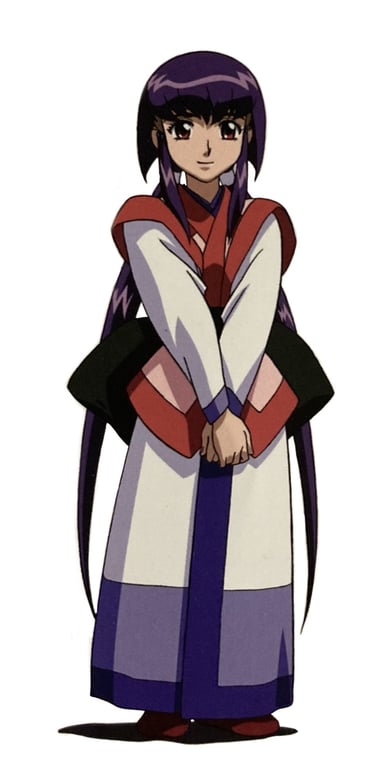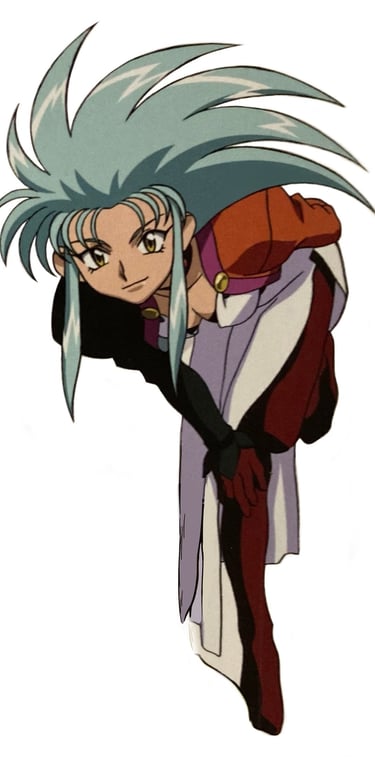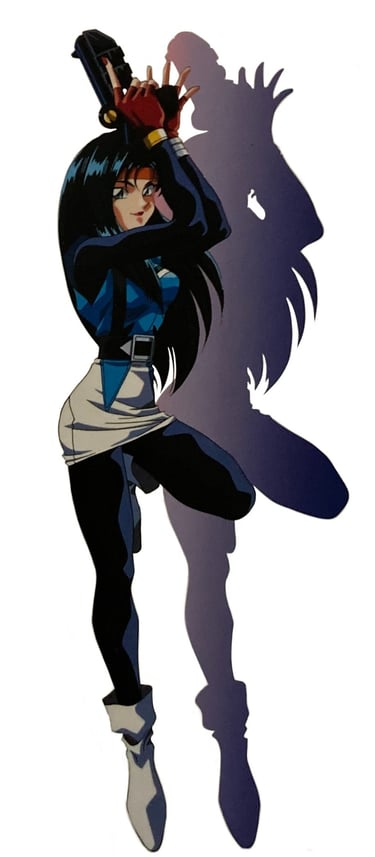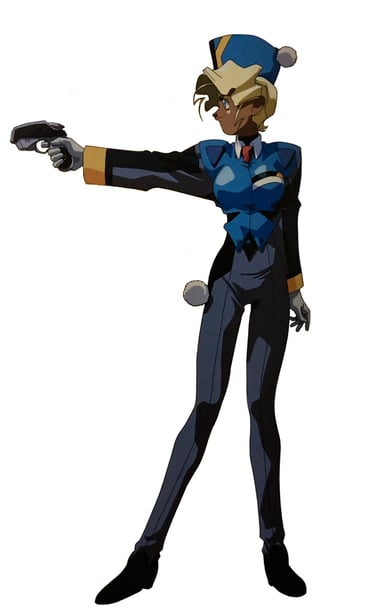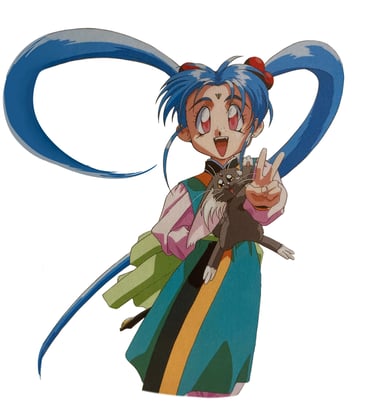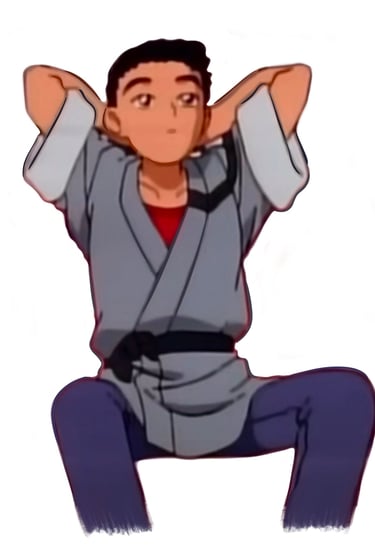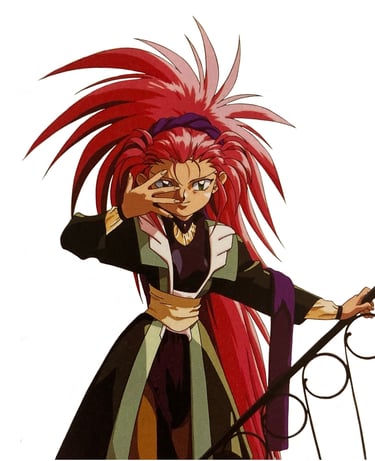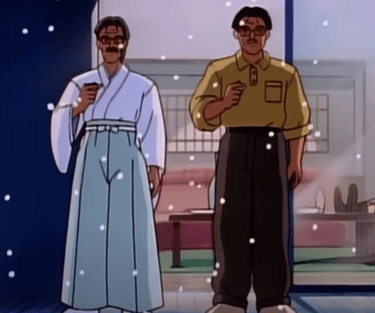
Of Heroes and Harems and Scary Villains: Pondering Tenchi and his Stash of Lovable, Troublesome Gals
Although Tenchi Muyo! Ryo-Ohki was initially squeezed within a dense, six-episode script crammed with data-dumps of convoluted lore, the plot was soon lost to its host of dynamic characters. Namely, the women. Or, as some would joke, Tenchi’s ever-exotic, even-borderline erotic, harem of lovely aliens. Looking back, fans don’t so much recall that Yosho is Princess Ayeka’s half-brother or that Ryoko is actually a symbiote created through arcane scientific ingenuity. No, they remember Ayeka—the regal, proper, and often dejected princess. And they remember Ryoko—the rascally space vixen accustomed to always getting her way.
Indeed, the Tenchi saga, as it splintered into television and across other forms of media, became one of personality over plot...for better or worse. On the one hand, this switch in emphasis probably allowed TV’s Universe to triumph, in some fans’ minds, as the property’s quintessential representative. But on the other, it’s only Ryo-Ohki, with all its interwoven myth and deep history and political pretense, that continues to receive new installments while its sister timelines now languish in obscurity.
Whichever approach is better, whichever version is the superior, one fact remains inescapable: the buxom juggle of competing Tenchi continuities makes developing a definitive profile for its many characters a losing struggle. Motivations, romantic interests, even power levels all change and shift and contradict depending on the series. The characters are meaner or sweeter, more vain or gracious, more sympathetic or wicked. Such is the tangled matrix of the Tenchi mythos. There is no overriding sum or default personage.
Just personas…as seen in the analyses to follow.
Complicated Characters Multiplied by Countless Continuities
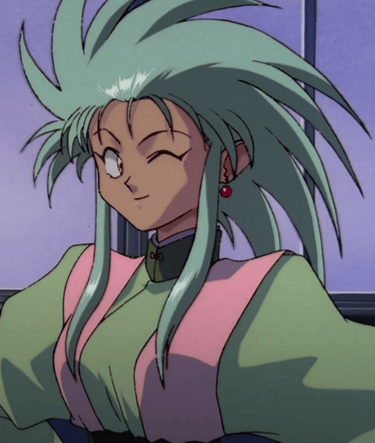

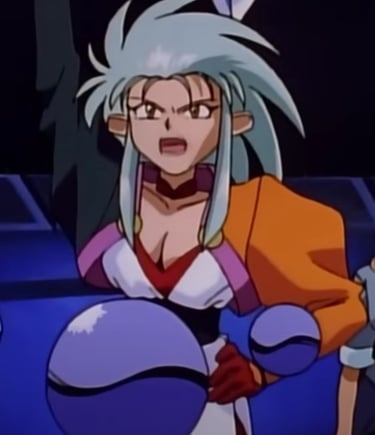

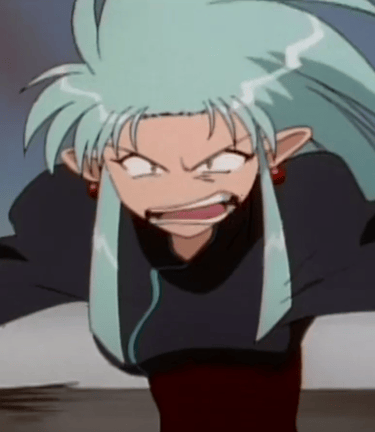

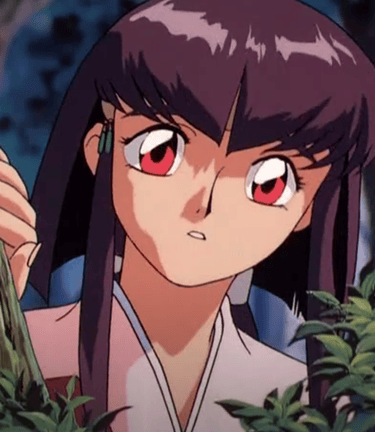

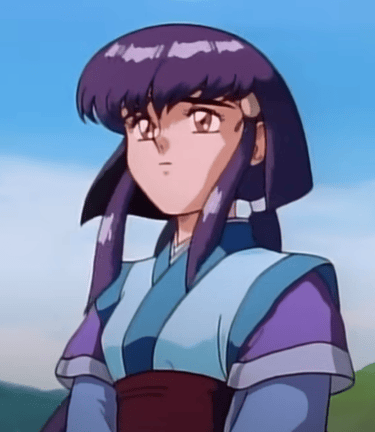



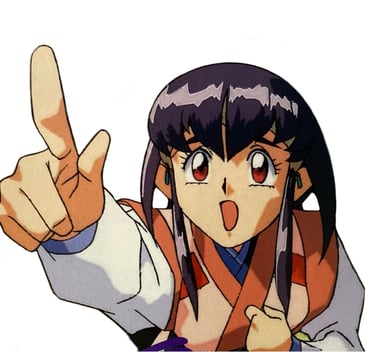

Ryoko as seen across the three-leading animated continuities--OVA (top left), Universe (top right), and Tokyo below. The Tokyo shot suits her best...does it not?
Likewise...Ayeka as depicted between the OVA and two TV series. OVA and Universe on top, the wackier Tokyo below.
Choose Your Character!
Tenchi Masaki
Ryoko Hakubi
Ayeka Jurai
Sasami Jurai
Washu Hakubi
Mihoshi Kuramitsu
Kiyone Makibi
Yosho, Nobuyuki, and Ryo-Ohki
Tenchi Masaki – Country Boy. All-around decent guy. Tenchi is an Ordinary Teen Facing some Extraordinary, Planetary Problems.
Despite what the newcomer may assume, “Muyo” isn’t Tenchi’s last name. The would-be suffix is, in fact, a clever pun meant to represent a rather homespun, sheltered boy suddenly plunged into the depths of a strange, cosmic destiny. Vainglorious villains, beautiful maidens, a fight for the galactic throne…Tenchi is a kid hit with some very adult considerations. Indeed, “Muyo” is a list of meanings and intuitions: useless, no need for, Heaven and Earth, this side up…different inferences but the same unfortunate joke. Fate has played quite the prank on Tenchi, turning the simple boy’s life into one of space battles and political intrigue and, of course, a love-pentagon between some winsome vixens.
Is Tenchi lucky? As another sage swordmaster once said…yes, if taken “from a certain point of view.” Which is to say Tenchi’s life is one of perpetual superposition. Anything can happen or not happen; he’s both blessed or cursed. Obscure or famous. Pacifist or powerful warrior. More than a joke, Tenchi’s life is one of irony—the one soul who doesn’t want the attention, the power and the women, is the one who’s given the full buffet. He’d be the perfect self-insert for any virile, sexually-awakening man except, unlike most growing boys, Tenchi receives his women with relative reluctance, his awesome alien heritage with more bewilderment than amazement. Tenchi is the everyman who’s quite unlike anyone else.
Perhaps it’s this ambivalence that makes him special—worthy of the great mystical powers he soon uncovers within himself. And yet, despite sharing a household with women representing all corners of the galaxy—nay, the universe—he never utters more than a groan or a cry at their destructive antics, never ponders the mysteries they hide, never thinks to ask the many questions any normal person would hold.
Ryoko, you’re a space pirate? What’s that like? What great adventures or planets have you seen?
Or…
Ayeka, you’re a princess of the Planet Jurai? What’s the life of royalty like? How does Jurai compare to, say, life here on Earth?
Instead, he accepts his otherworldly visitors uncritically and without curiosity. Not as space goddesses brimming, surely, with tales of wonder and wisdom, but merely as girls…sometimes pleasant, sometimes pesky, sometimes destructive…but otherwise mundane. He shows no fervor, no vigor, no great interest into their hobbies or past. He’s nice, he’s pleasant…and bizarrely indifferent.
Which is to say, Tenchi often feels flat to the point of blandness. Even his initial mischievousness (he does set a “demon” free, after all) all but evaporates as the story shifts to his new roommates: those glorious angels who’ve fallen from the heavens…and fallen in love. They’re as confounding as they are arousing, but the boy hero neither truly laments his position nor fully embraces it, either. He just groans and shambles on, tilling his family’s carrot fields as his ladies wait, hope, pray…and fight. All the time. Pining to be his wife.
No, Tenchi isn’t useless. Quite the contrary, he’s plenty needed…or at least desired, making the “Muyo” joke a weird misnomer.
But if Tenchi is the saga’s eponymous star, his co-stars are the eclipsing moons. As the women gather and enchant with their shenanigans and endless antics, they become the real story—the true vehicles of character development and plot. The reason, really, for their invisible audience to assemble. Tenchi, for all his eternal privilege, is not unlike his incredulous viewership watching from their TV sets. Both are onlookers gazing into a zoo of volatile, fascinating characters, all unfathomable, all unreal. Tenchi is the key, both literally and figuratively, to a sea he can sail but never settle. He’s irony incarnate, folded again upon himself. A kid given the powers of a god, but stricken with the ambitions of a farmer. He’s lonely…but just wants to be left alone.
Or does he? Maybe that harem is exactly what he needs. An incredible superposition, indeed.
And that’s the saga’s cruelest joke. Tenchi isn’t useless. He’s not finicky. He’s not needy.
He’s simply achieved a dream too obvious to see.
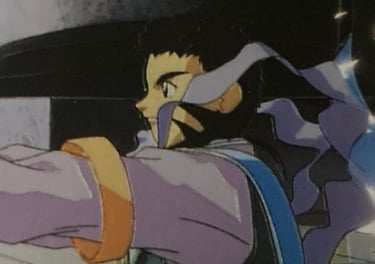

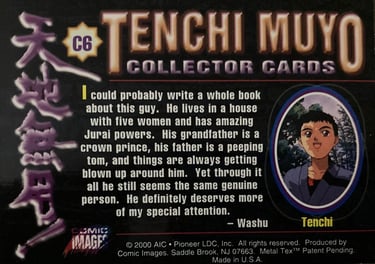

In 2000, Comic Images produced a collectible card set focused on encapsulating Tenchi Muyo's initial 13-episode OVA run.
Special cards, like this one (shown front and back), have Washu providing a quick dossier on each of the main characters (excluding herself).
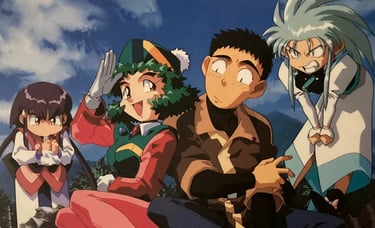

More than useless, Tenchi is simply clueless. Not just in handling his would-be suitors, but deciding whom, if any, he'll eventually choose.
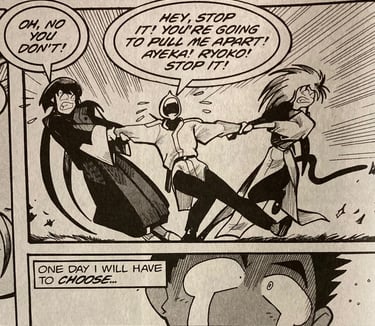

Funnily enough, the short-lived American comic understood what, for most fans, was the true point of the property. Which girl was best for Tenchi? And, once he does choose, what might be the ensuing consequences?
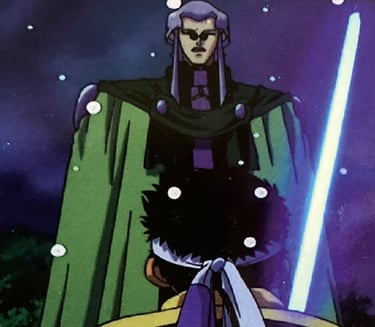

Haruna from the film Tenchi Forever! The Movie
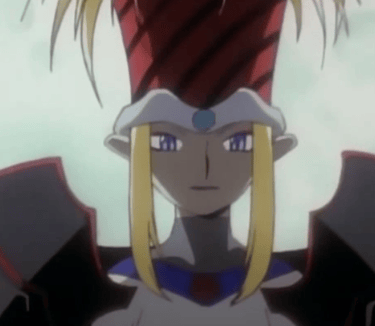

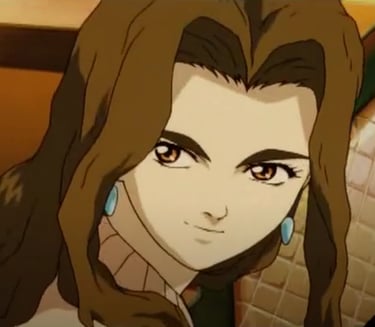

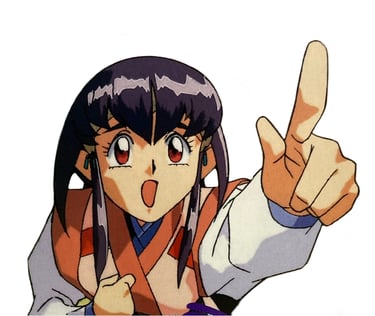

Although Lord Tenchi does face his share of conventional villains, many of his adversaries are sympathetic in nature...requiring more mercy and heart than power and sword.
Kagato from Tenchi Muyo! Ryo-Ohki
Yugi from Tenchi in Tokyo
If Tenchi is the saga’s primary hero, Ryoko is the franchise’s greatest icon. When the title “Tenchi Muyo” is uttered, it’s not the boy’s face most see—but Ryoko’s, that sassy, snazzy, snappy space pirate who has yet to be flagrantly duplicated by any proceeding/competing anime or manga. For all the saga’s amazing characters and designs, Ryoko is the most unique, the most viscerally compelling…the one who creeps deep into every viewer’s consciousness, who invades their very imaginations. She’s a fascinating blend of masculine strength and feminine ambition. A beautiful powerhouse and grouchy clown. Equal parts comedy relief and bad-assery; as much a battle maiden from the stars as she is a starry-eyed teen preening before the man she needs…
Tenchi—no need for anyone else.
Indeed, more than just a fawning love interest, more than just being a fetching lass of style and finesse, Ryoko can be an outright deviant. Her name says as much, its “bringer of demons” connotations hinting at what might be her truest nature. She can be sweet, she can be selfless…and sometimes, she can be quite the witch, manipulating and scheming and, yes, even killing when needed. The latter shortcoming, perhaps mercifully, is largely ignored in the three leading continuities. Most of her crimes, even atrocities, happen off-screen…for if they were seen, she wouldn’t seem so nearly pristine.
Which, in truth, is Tenchi’s actual pickle. His problem isn’t deciding between the punk pirate and her rival, the proud Princess Ayeka, but rather choosing between Ryoko’s own disparate halves. Can he dismiss, let alone forgive, the crimes of the pirate’s past? And, if so, will Ryoko then become the good wife, domesticating herself to better serve his needs? Maybe. In the OVAs, the sub-moral demoness does soften as the series progresses, her destructive past portrayed, and explained, with a bit more sympathy. Poor upbringing brings bad consequences.
But in the other shows, Ryoko’s troublemaking seems more a product of her own (mostly inexplicable) powers. She can fly and transform and shoot beams from her hands…and with that kind of advantage, the galaxy does become her perpetual playground. Like a video game in which she’s the key, overpowered player, she does what she wants without much reflection.
Can she, in any incarnation, be truly redeemed through Tenchi? Or will he, should he select her, find himself ripped through space in many a rip-roaring escapade, becoming the pirate’s would-be partner and accomplice as they both bounce between mischief and delinquency?
Princess Ayeka, if not perfect, still exists to bolster Tenchi’s better nature. But Ryoko, that pirate, that siren, that devil…serves only to subvert. Will Tenchi tame that fallen angel?
Or will Ryoko remake him into her own graven image?
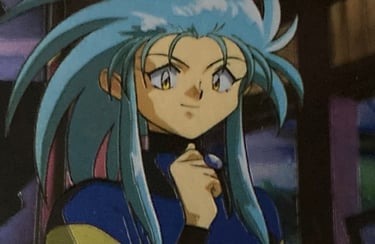

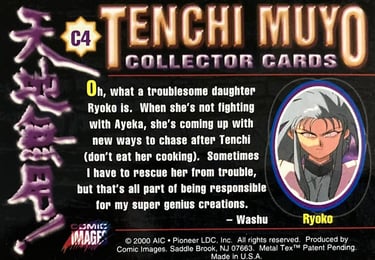



Ryoko might be womanly, but she definitely isn't a Lady. Unpredictable, careless, uncouth...if she wins Lord Tenchi's heart...it's he who'll likely lose.
Washu's description of her "daughter" (Ryo-Ohki timeline only) overlooks the character's messier history. Killing and destruction without much reflection or remorse, Ryoko runs from justice for fun and lust. A wily temptress, indeed.
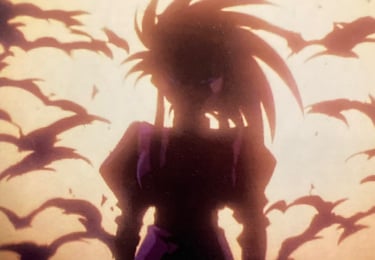

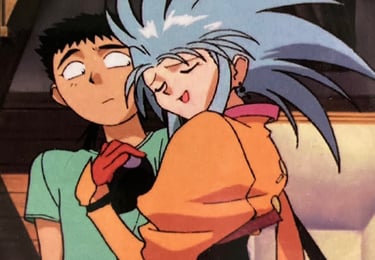

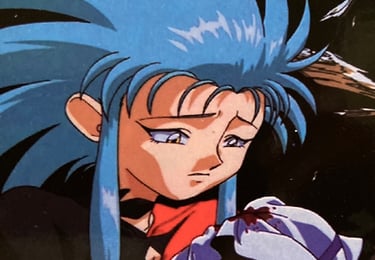

Ryoko is a character of many moods, many faces. Bloodthirsty warrior, doting would-be girlfriend, heartbroken lover...Ryoko is a maiden of many. At her best, she's undeniably charming...a fetching creature dropped from the heavens or dredged from hell...depending on the reality. Perhaps she can best be likened to a succubus--sexy and soft in the all the right places, but once she decides, she won't be denied.
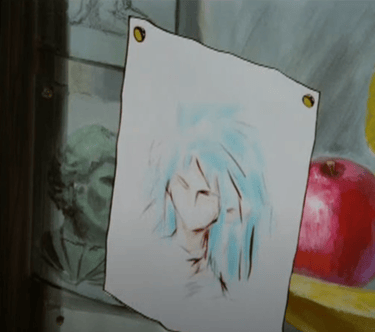

Whom does Tenchi choose? Only the OVAs give a direct answer. A very diplomatic answer. A very cop-out kind of answer. But the other continuities are more coy, merely hinting where the befuddled Tenchi might be leaning. One such clue is this sketch which, despite having amnesia, Tenchi produces in the movie Tenchi Forever!.
Ryoko Hakubi – Symbiote or space pirate, villainess or anti-hero...Ryoko is a femme fatale of both ire and desire. A lush, blushing maiden mixed with the soul of an incorrigible scoundrel.
Ayeka Jurai – The lovely Crown Princess of Jurai is young, innocent, proper…and completely unprepared for the devious charlatan waiting ahead. Everything Lady Ayeka has ever known—the goodness and grace she strives to embody—is tested by her direct opposite: a rapacious space pirate chasing the same man.
Alas, poor Princess. She’s been blessed with seemingly everything—wealth, privilege, talent, and a bounty of beauty. But the lass still lacks what she desires most—a husband, a prince, despite her ever-prayerful, vigilant search. And then, through what seems a gift of Fate, she finds him. Tenchi. Her love and her future…only to realize he’s all but been seduced by her opposite. Ryoko, that criminal. That killer. That heartless harlot. That lusty hussy.
And, in truth, Ayeka is not wrong in her opinion.
The name “Ayeka,” in many ways, is the perfect emblem for the lovestruck Lady. Traditionally meaning “willowy” or “needing a man’s assistance,” the princess longs for true love like any true maiden. Problem is, the villain isn’t a simple dragon or troll, but an amoral witch of trick and seduction. The older Ryoko threatens to destroy the younger Ayeka’s only fairy tale, her one hope for true happiness. And rightfully, this leaves the princess fearing the worst. She might actually lose—a possibility that’s as much a blow to her pride as a crack to her heart.
Indeed, Ayeka’s real battle is less with her conniving rival and more with herself. Can she still play the angelic lady when the demon keeps winning via her sneaky tactics and seductive acts? When the prim, pure, and demure Ayeka continues to be overlooked…is she then excused to use some of the pirate’s more aggressive techniques?
It’s a matter of both honor and pride, and the Princess might have too much of both. She’s too learned, too much a Lady of Grace and Faith, to handle a pirate of no rules, no scruples…who’s essentially a rowdy man housed in the blouse of a sultry wench. And this is why, sadly, Ayeka often loses.
But the one most at fault is neither the vamp nor the clueless girl, but the boy they both hope to enjoy. Tenchi. The one who can’t, who won’t, make a choice. No matter how well or badly Ayeka acts—high-minded or rude, classy or abusive, desperate or shrewd…it makes no difference to the boy avoiding all decision, dodging all sides, refusing to judge between pirate gray and lady white.
Which girl should Tenchi pick? Without Ryoko, Ayeka is perfect. With Ryoko, Ayeka is aimless…always in flux, never her best self. A smudge on an otherwise spotless crown.
Unfair or not, Ryoko wins despite her sins….
…while the Princess sits incredulous, still yearning for the One who would adore her more.
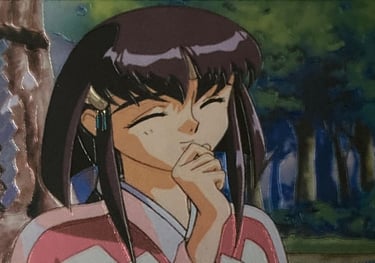

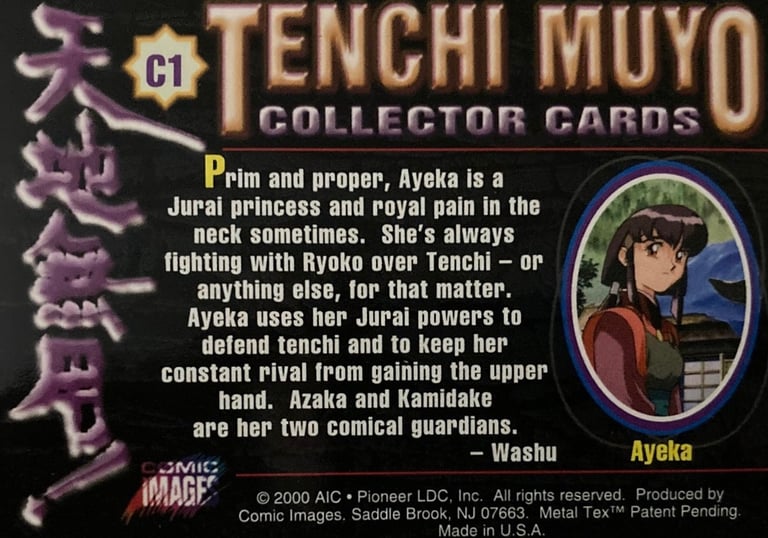

Ayeka, at her best, has no ready parallel. Although not a goddess, if Ryoko were removed from the picture, she'd be the next best thing.
Washu's brief on the Princess isn't exactly flattering, but it's true that, sadly, Ryoko often succeeds in dragging the Lady down into her jealous swamp of barbs and taunts. Ayeka's pride, perhaps, is her one true flaw.
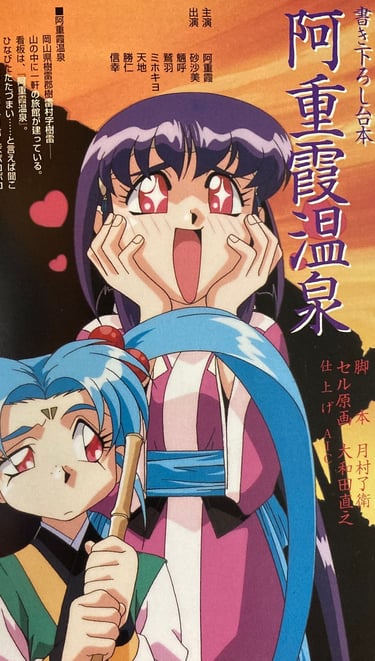

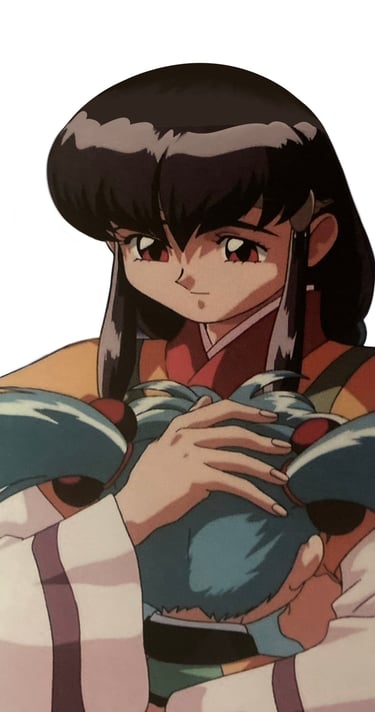

Although often defined by her opposite Ryoko, Ayeka has a second contrast in her openly cuddly and bubbly sister Sasami. Indeed, Ayeka's face of restraint is a fragile one: just as she loses her temper to Ryoko, her sweet nature rebounds when Sasami is around.
Just who, really, is Princess Ayeka...the most complex character of them all?
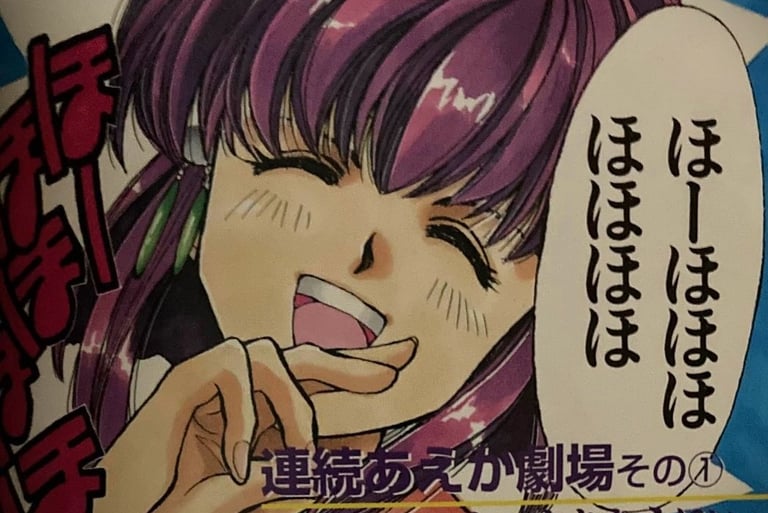

Sasami Jurai – The epitome of cute. The physical manifestation of exuberance and affection. The steward of optimism and sisterly cheer...young Sasami is as much the series' mascot as Ryoko is its icon. And yet, behind the glee and giggles is a hidden maturity that predates her years--Sasami is a considerable woman confined to the lines of a precocious little girl.
If the Tenchi cast is one of contrasts (Ryoko vs. Ayeka, Mihoshi vs. Washu/Kiyone), then Sasami is its one anomaly. The child and baby to her cohorts’ feminine wiles and womanly ways, she stands distinct as the sensible voice in her company’s cacophony, the stabilizing anchor amidst their waves. She cooks, she cheerleads, and by virtue of her youth, she compels them to behave and remain relatively sane.
And yet, in her innocence lies a pretense…good things come to those who wait, and time is on Sasami’s side. She’d a bud of subtlety, blossoming almost beneath her superiors’ notice…inching her way into Tenchi’s consciousness as her oblivious rivals fight amongst themselves. Wittingly or not, the littlest princess is quite the opportunist. Cute, unassuming, but maybe, just maybe…scheming discreetly.
The doting foil varies little between her many incarnations; endearing, eager to please, and a culinary expert, she’s the perfect housewife stuffed unabashedly into a pint-sized package. The cynical might deem the waif a borderline lolli—the diminutive alternative to her contemporaries’ greater favors. But her animators, mercifully, rarely exploit…placing their emphasis rather on her generous character, her ardent heart. Indeed, it’s her snow-white soul that admirers adore…what exists within versus what’s beheld without.
Whom does Tenchi choose? The feral pirate? The regal Lady? Or the little waif who, by playing the long game—by taking her time growing up—wins her man through patience and grace? Might Tenchi, after running from harlots and demanding damsels, find love in the one he’s constantly overlooked—the fair Sasami, ever-biding by his side, waiting quietly without complaint?
Ever gracious, but ever tenacious, she’s a cherub upgraded to grateful god.
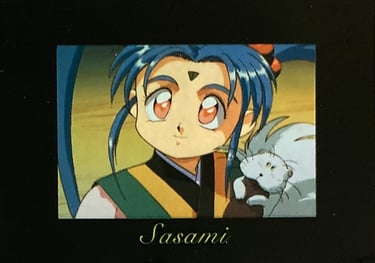

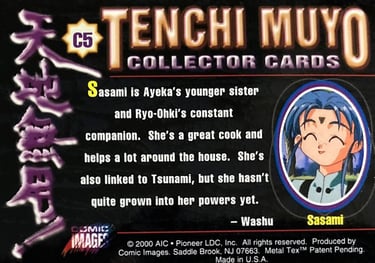

Sasami is introduced to the franchise as being a bit mischievous, but she quickly becomes, in some ways, one of the more "mature" characters of the Tenchi household.
Washu's description of the wee princess is rather simplistic considering her complicated relationships with her family members...and even herself. In the Ryo-Ohki timeline, Sasami is more than just a cute kid...but an eternal goddess coming to roost.
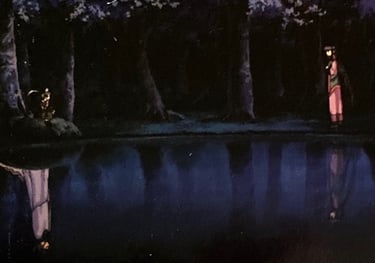

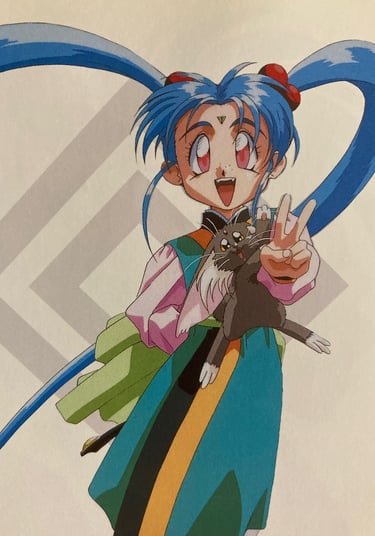

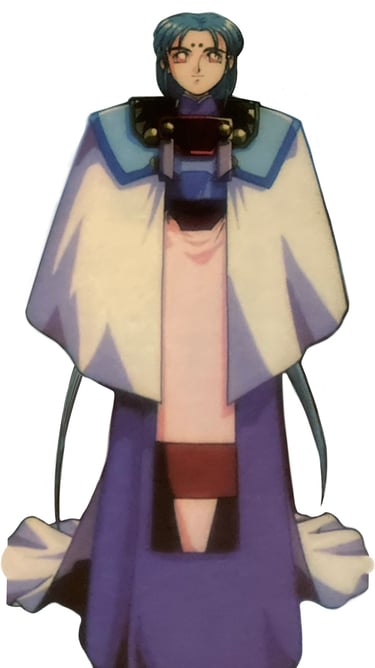

Unlike the TV continuities, in Ryo-Ohki, Sasami is revealed to have merged/assimilated with the so-called goddess Tsunami, and early on, it's a source of great confusion and distress for the little girl. Fortunately, Ayeka, Tenchi, and the others handle the revelation with fitting grace, allowing Sasami to find peace in being her innocent, carefree self a little longer.
Washu Hakubi – Mad scientist, cosmic goddess, or just a troublemaking accomplice who travels the stars? Whatever the continuity, Washu is smart to a fault, both wise and reckless, and definitely zany. She sometimes likes being called "Little Washu," but "Little Wacky" is definitely truer.
Washu would be the Tenchi Saga’s most complicated character is she weren’t so mysterious. No matter the rendition, Washu’s past is a murky stream of the strange and incredulous, the incredible and unthinkable. But the gist is that she likes to experiment, likes to create, likes to invent. And my, how that foments some iffy consequences.
Redemption in the Muyo Mythos is a theme often encapsulated in the form of Ryoko, the space pirate whom, through Tenchi, teeters toward incremental reform. But Washu’s own trek for deliverance is equally poignant, even more poetic. In Ryo-Ohki, her meddling with the secrets of life gets her imprisoned by her traitorous partner, the villainous Kagato, who then uses her tech for his nefarious ends. And in Universe, her uber-destructive inventions get her a one-way banishment to primitive Earth. Indeed, Washu carries a galaxy of guilt she can’t hope to purge…until she meets a certain boy. Through Tenchi and his lovely gallery of gals, Washu’s weird science finds a greater purpose. More than an avenue to power or a means to subvert, the scientist’s unfathomable mind becomes the desperate deus ex machina needed to rescue her new friends from ongoing trouble…again and again. In the Masakis, Washu has gained a family and, by consequence, the tools to redemption—for personal reinvention. Finally, she’s using her intellect for the greater good.
Is Washu the universe’s greatest scientist? It’s a question that matters less for a woman who would become, more than celebrated scientist or esteemed professor, the highest matriarch of the Masaki Clan. Not the family’s heart, perhaps, but certainly its head. Washu is the imaginative juice that keeps the Masaki household protected and running smooth.
What does it profit a man to gain the whole world if it means losing his own soul? Fortunately for Little Washu, by fighting for her friends, she saved herself. And made a heaven for everyone else.
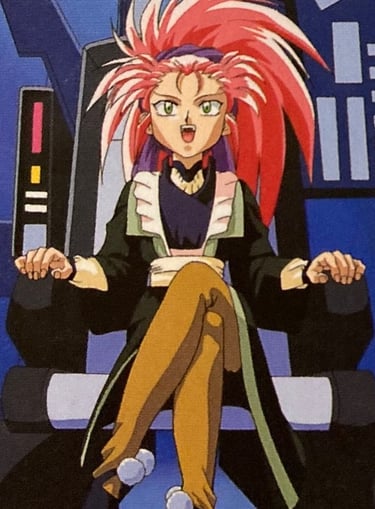

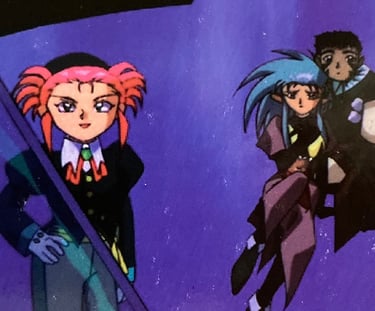

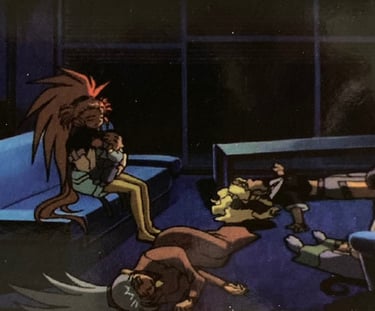



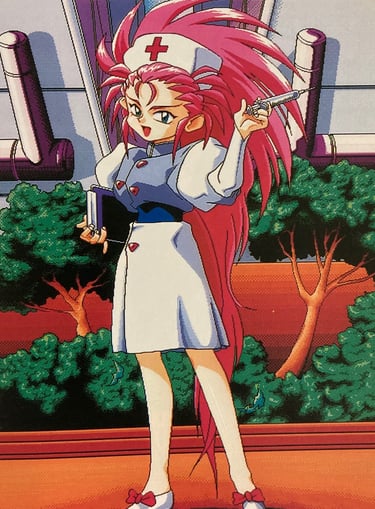

Washu is a carousel of different personalities. In some ways mischievous imp, in others, empowered goddess...beneath it all she does contain a "human" side. One who hopes to find love and become a mother. One courageous. One, sometimes, even vulnerable.
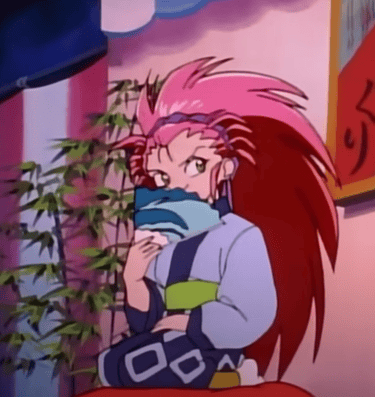

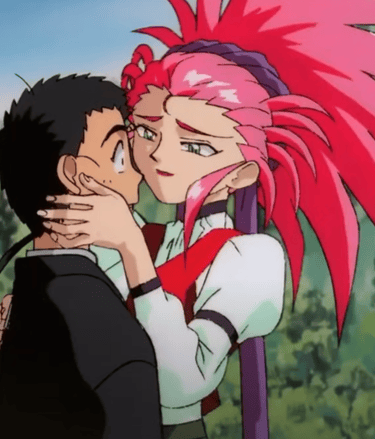

Is Washu a big brain in a petite package, or a big brain in a tall, lithe, and shapely one? The TV continuities resign Washu to her cuter incarnation, while, presumably, Washu will eventually retake her maturer shape in the original series. Here, she sits in a Kimono (Tenchi Universe), and takes her full adult form (Tenchi Muyo! Ryo-Ohki). Which fetish is the true Washu?
In Tenchi Muyo! Ryo-Ohki, Ryoko is Washu's creation, an organic cyborg of sorts formed from the scientist's own ovum. Much more recently, Washu has been inclined to have a baby the old-fashioned way. Tenchi, you're needed!
Mihoshi Kuramitsu – Ever heard of Murphy's Law? Mihoshi's Law is the feminine equivalent, the Galaxy Police Officer's inexplicable penchant for twisting the very nature of reality's proverbial arm. The bubbly Galaxy Police Officer's luck can shift from good to bad, impossible to possible--confounding all those fortunate, or unfortunate, enough to share her air. Mihoshi is perhaps the Galaxy Police's most lovable officer...but most precarious, unpredictable detective.
Mihoshi is a pair of cute, pink, fuzzy dice caught in a perpetual reroll. Without intention or meaning, she affects the very essence of probability, the very spin of causality, manipulating that quantum continuum in ways that even puzzles Washu. What’s more, Mihoshi does so without even trying…without even knowing. More than a ditz or bubbleheaded flake, she’s sort of the perfect cosmic, idiot savant.
Indeed, one could be forgiven for dismissing the would-be, well-meaning, First-Class Detective of the Galaxy Police as being little more than the franchise’s stereotypical blonde—a cute n’ cheerful but clueless girl designed more for comic relief than dramatic depth or deep-rooted pathos. And, no doubt, her Tenchi Universe portrayal is all that and worse, the girl reduced to being little more than Kiyone’s unwitting, unapologetically self-sabotaging partner.
The original series, mercifully, treats Mihoshi a bit more fairly. Although still a klutz and, at times, a bit dim-witted, the girl is also an undeniable sweetheart who lacks the meaner streaks of her bickering rivals. She might get a mite high-strung when matters get tough, but generally, she’s the bubbliest bunny of the Tenchi team (Sasami notwithstanding).
And, along with being the sweetest…she might be the most tragic. Although barely mentioned and scarcely implied, a certain attack or accident in Mihoshi’s past is what ruined her First-Class reputation in the police force…and might explain her now-addled nature. What does a more competent, no-nonsense Mihoshi look like? Honestly, such a version is hard to imagine.
But if it is true—that Mihoshi is the victim of an invasive mental scrub—then her numerous antics, shenanigans, and comedic accidents that comprise much of Tenchi Muyo! Ryo-Ohki’s DNA become but the crass jokes tossed at a handicapped person’s expense. Gags extracted from an innocent, damaged girl.
Yes, under that light, those “funny” episodes now read a whole different way, a scream for vengeance now instilled in the girl’s every flub, every giggle.
Sometimes, simple is best. And maybe, just maybe, Mihoshi doesn’t need a dubious backstory or tragic accident. She just needs to be Mihoshi…a beautiful, adorable, sweet-natured girl…
…who, like everyone else, just needs an understanding man to love her whole.
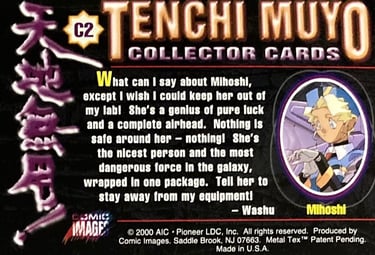

Mihoshi' is a character study in cluelessness; per her picture here, she rarely ever fully understands what's going on...at least at first. Life can be confusing, even scary, for the poor damsel who tries her best when not distracted by a million other fun or shiny things. But in her quirks is a tireless, loving spirit. The girl's too cute to lose.
Washu's own read on Mihoshi is apt - the woman is a walking time bomb, although her "luck" often favors her newfound family in the long run. Through her probability-shifting tendencies, she rescues Washu and even helps Tenchi defeat a would-be suitor for Princess Ayeka's hand.


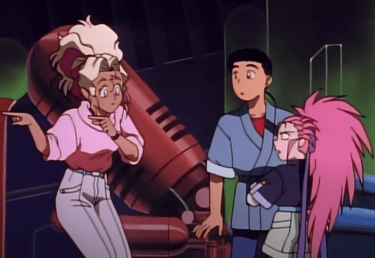

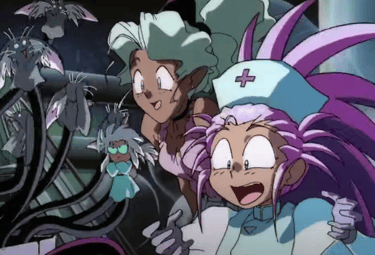

Mihoshi can be a terrifying counterpoint to Washu no matter the timeline, but she's usually compared to her partner Kiyone, her ever-suffering but talented partner.


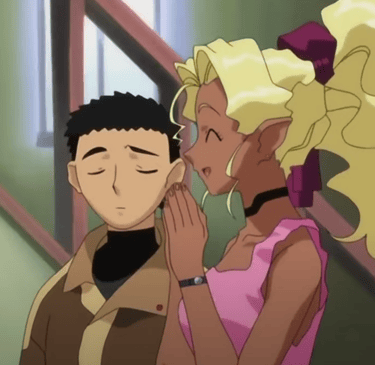

Supposedly, maybe, there was an incident in Mihoshi's past that could be the reason for her continued incompetence and shaky memory. But, if so, this makes Mihoshi the butt of a running train of jokes she doesn't really deserve. She requires sympathy and patience, not eye rolls and constant beration.
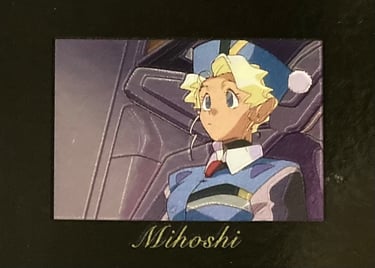

Kiyone Makibi – Beautiful, capable, and woefully underappreciated...Kiyone is the poorest superstar, the champion who always lands last. The officer is not only overlooked by her superiors at the Galaxy Police, but excluded from the very timeline from whence she was born. Kiyone is the hero everyone loves, but nobody seems to see.
If Princess Ayeka dreams of a prince, Kiyone dreams of a promotion. Of recognition. Just some old-fashioned good luck. The two characters actually share some interesting parallels: Both are sensible, responsible, and polite. Both are beautiful and competent. Both should have no difficulty finding a spouse or gaining prestige. And yet, the two are also haunted by their inescapable, respective opposites. For the princess, that ghost is Ryoko, the charlatan who cheats and manipulates at the maiden’s genteel expense. And for Kiyone, it’s Mihoshi, the ditzy alternative to Kiyone’s smarts, the saboteur to Kiyone’s hopes. In a vacuum, Ayeka is the Heavenly Maiden she strives to be, and Kiyone is the Super Cop everyone respects, knows, and wants. But when hit by their antithesis, both are diminished. Neither can win.
Of course, to blame Mihoshi for all of Kiyone’s ills is a smidge unfair; only in the Universe timeline does Kiyone heinously suffer from her partner’s foibles. Mihoshi, in truth, is another abused creation, an otherwise pleasant girl manipulated by screenwriters more devoted to stoking stereotypes than respecting the dignity of their creations. In a less contrived existence, a Miho/Kiyo combination might make for a remarkable fusion…the perfect balance of complimentary twins. Why doesn’t Kiyone show more overt affection for Tenchi, as some have wondered? Mihoshi could the distraction...the girl always there, standing by her partner’s side like any good, supportive wife.
Which, perhaps, begs a greater question. Might Kiyone, in some sense, benefit from her constant struggles? If Ayeka, by losing to Ryoko, at least defeats her pride in the end—becoming, maybe ironically, an even more idyllic woman—wouldn’t Kiyone’s ongoing tribulations only make her humbler, more empathetic? One can imagine, as Kiyone finally ascends the GP’s ladder of rank and distinction, she’ll do so with a certain grace and wisdom she wouldn’t have gained without the help of her child-like partner. Through her disappointment, she’s evolved from underdog to mother wolf, serving because she’s needed—not for the glory. Not because she’s seeking another distinction or award.
And maybe, just maybe, Kiyone will transcend the Galaxy Police altogether, rejecting its political chicanery and career contrivances for a vocation of higher purpose and worth.
Pity, then, that despite her potential for future achievement, no such honor will come from the universe that first gave her birth. The Mihoshi Special has long been dumped from the Ryo-Ohki canon, reducing Kiyone to the specter of a suggestion eventually overwritten by Noike, her inexplicable substitute. Kiyone Makibi, the saga’s symbol and tribute to all those abused but resolute, has been usurped from within her dimension and forgotten from without.
Indeed, when the gods forget your address, how do you ever go home?
And this is why, sweet Kiyone, you’re the sagas’ most meta, its most tragic case. And, in a strange way…its most enduring.
There, but not. Forgotten, but always loved.
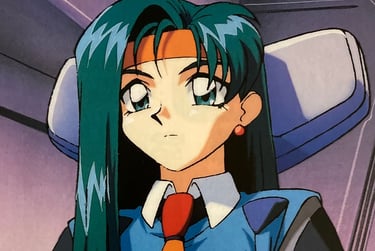



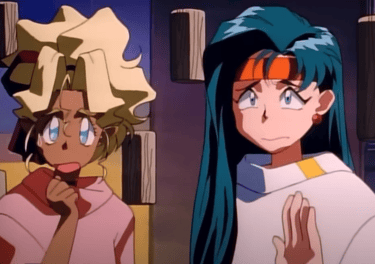

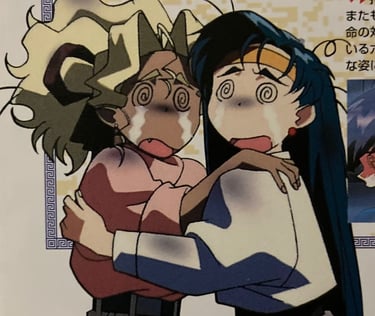

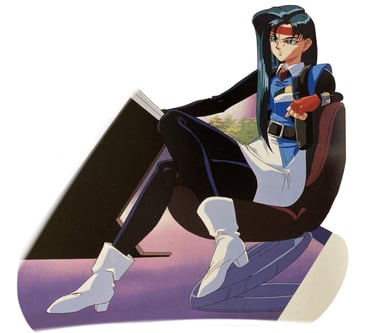

Kiyone is capable, dependable, and above all else, sympathetic. She deserves more than what's been served.
Kiyone is usually viewed, probably unfairly, through a Mihoshi-centric lens. Why not have a storyline, nay, a series, that features the lovely cop going solo?
Mihoshi might be a frustration to Kiyone's career ambitions, but at their best, the two share a sweet, sisterly rapport--one that, maybe, could even grow into something more.
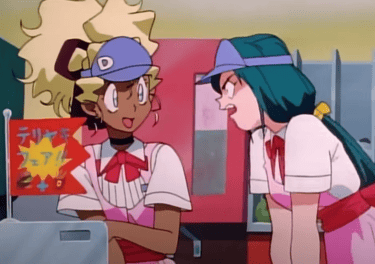

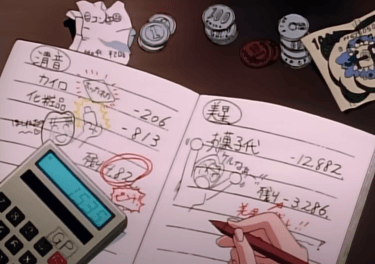

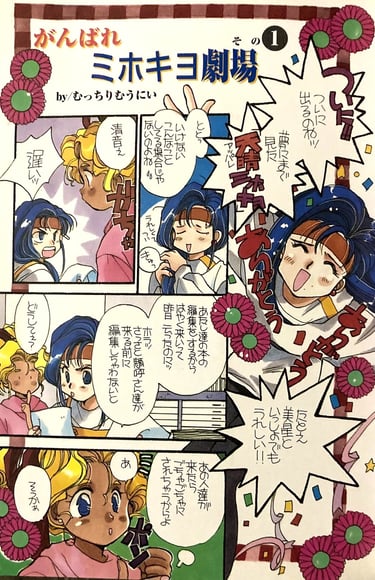

Kiyone, ever the responsible one, tries to configure the monthly budget she shares with Mihoshi. Clearly, she's struggling...but check out her cute doodles! Is there a sensitive artist hiding beneath that serious exterior?
Kiyone's regular exclusion from the franchise was once a running gag in itself, as seen in this cute comic included in the Miho and Kiho Character Art Book (exclusive to Japan). Indeed, in the tall, far-right panel, Kiyone cheers to her readers: Finally, it's my turn to appear!
Yosho – Katsuhito Masaki
Tenchi’s grandfather is, in many ways, his surrogate father—the one most involved in the boy’s life and development. He’s wise, patient, good-humored…and despite his royal lineage, completely apolitical. No matter the continuity, the Juraian prince is content to live on Earth in self-exiled solitude. But there is a subtle difference between his two leading incarnations: in Ryo-Ohki, he seems intent on having Tenchi take his place as royal heir, while his Universe counterpart seems more pleased to have Tenchi deny the throne for his Earthly domain.
Is one mindset better than the other? Should Tenchi accept his royal destiny on Yosho’s behalf, abandoning his home for the Juraian throne? Or should he follow the master’s lead, choosing Earth as his place of residency…of destiny?
It’s a pickle bestowed from grandpa to grandson, an almost devious maneuvering in which one’s duty is dumped unapologetically onto the next generation—a golden inheritance crossed with a cruel caveat. Indeed, Tenchi prefers his freedom, his right to choose; it’s the one virtue he shares with Ryoko, his otherwise opposite…but it’s a big one. Becoming emperor comes with plenty of perks, but personal autonomy isn’t one of them. Tenchi’s serene, carefree days will soon be replaced by ritual and decorum and a galaxy of problems.
It's a bait and switch that may lead Tenchi to greatness, but also leave him enslaved to a fate that, perhaps, was never really his.
Nobuyuki Masaki
The Tenchi Muyo franchise is one of opposites and parallels, and Nobuyuki offers yet another interesting contrast. Compared to Katsuhito, his soft-spoken father-in-law, Nobuyuki is affable, emotional, and a bit of a clown. And compared to Tenchi, his only son, Nobuyuki is animated, aggressive, and a bit of a lady’s man. If Tenchi can be considered shy or, at the very least, cautious…his father is all about seizing the day, or girl, as the case may be.
Although introduced in the original Ryo-Ohki timeline, the man is barely there, flitting in and out like a ghost between just a handful of episodes. Both Universe and Tokyo are kinder to the character, offering him enough airtime to become a true fixture of the cast—a family member versus being just the occasional interloper. Indeed, Universe even peeks beneath Nobuyuki’s cheerful veneer to reveal a soul still grieving the loss of his wife—Achika, Tenchi’s beloved, incomparable mother.
As a regular character, Nobuyuki probably deserves better, the quietly-lonely man ever-overshadowed by his household of dangerous angels. Although he does eventually remarry in the Ryo-Ohki canon, in the other universes, he’s still a man seeking another chance for love. The one to make him whole once more.
Nobuyuki Muyo, indeed.
Ryo-Ohki
Often referred to as a “cabbit”—a portmanteau of “cat” and “rabbit”—the universe’s cutest computer/starship certainly carries the qualities of both. Although adorable and, in many ways, the saga’s central symbol and mascot, the existence of Ryo-Ohki begs some tough philosophical questions. Can what’s essentially a furry computer contain the sentience--the necessary awareness and self-reflection--to form a ghost, that hallowed soul?
One hopes so. For Ryo-Ohki radiates enough personality, affection, and emotional zest to exceed the most lively of human souls…a girl who shines brighter than a star. The girl with the starship-sized, all-abiding heart.
She’s the “sweetest ride” ever conceived.
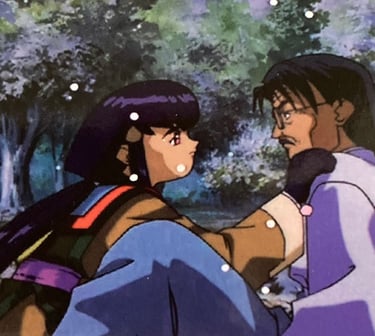

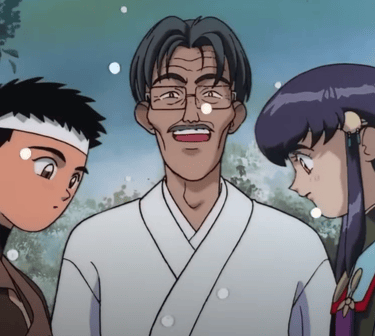

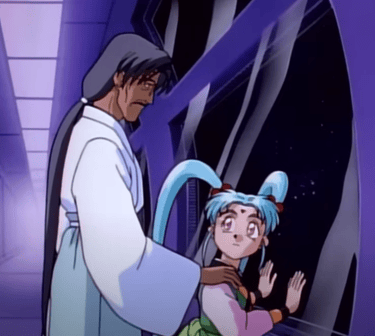

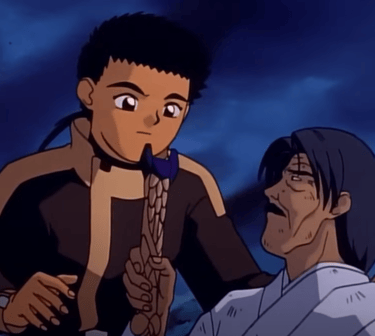

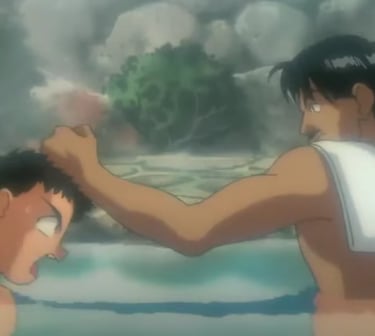

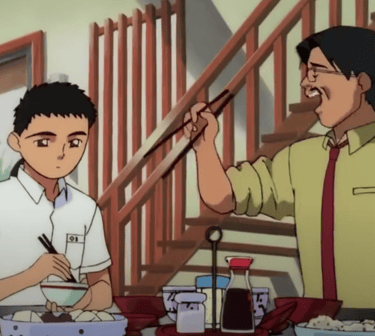

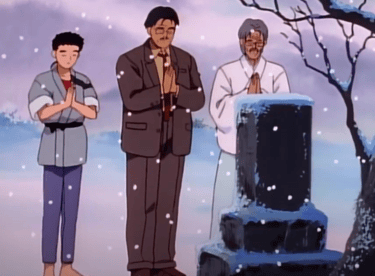



Yoshi is "apolitical" beyond Juraian politics; he's also doesn't play favorites when it comes to Tenchi's suitors. He does suggest Ayeka in one instance, but once again, it's more a move to stick Tenchi with a legacy he doesn't want for himself.
Tenchi and his father share a sort of "odd couple" relationship, with the father, especially in the Ryo-Ohki timeline, being played primary for comic relief.
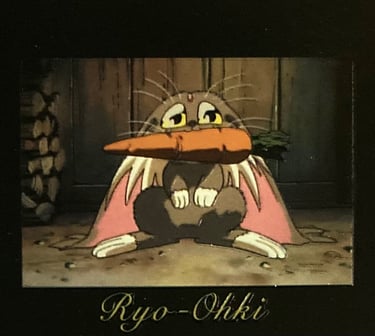

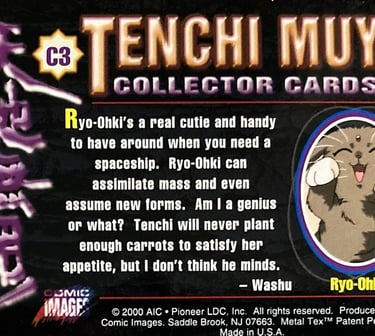

The Universe canon gives Yosho a greater range of character, from consoling a downhearted Sasami to passing his figurative torch to Tenchi.
Washu does a good job recapping her pet ship's various abilities. Beyond just being a carrot-consuming cutie, the little Cabbit can assume a number of different (and eventually humanoid) forms.
The Universe timeline treats poor dad with a bit more respect, depicting him as a figure longing for his passed wife and yearning for his home planet of Earth.
Contact: lostnostalgiaproductions@gmail.com
Website: www.lostnostalgia.com
Like what we're doing? Please consider throwing us a dollar into our Patreon page's tip jar!



